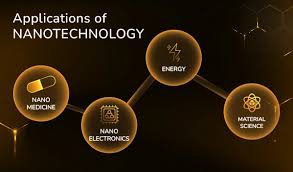
Nanotechnology Applications
Description
Nanotechnology is a field of science and engineering involved in manipulating matter on an atomic and molecular scale. It offers the potential to revolutionize various industries, from medicine to electronics.
Key Points
- Electronics: Developing smaller, faster, and more energy-efficient electronic devices.
- Medicine: Creating advanced drug delivery systems, tissue engineering, and medical imaging.
- Materials Science: Developing stronger, lighter, and more durable materials.
- Energy: Improving energy storage and conversion technologies, such as batteries and solar cells.
- Environmental Science: Cleaning up pollution and developing sustainable technologies.
Key Features
- Nanoscale Materials: Utilizing materials with unique properties at the nanoscale.
- Precise Control: Manipulating matter at the atomic and molecular level.
- Multidisciplinary Approach: Combining physics, chemistry, biology, and engineering.
Advantages of Nanotechnology
- Improved Product Performance: Creating products with enhanced properties.
- Reduced Environmental Impact: Developing more sustainable technologies.
- Advanced Medical Treatments: Revolutionizing healthcare with targeted drug delivery and tissue regeneration.
- Energy Efficiency: Improving energy efficiency in various applications.
- Economic Growth: Driving economic growth through innovation and new industries.
Author: HNK Globals Institute








